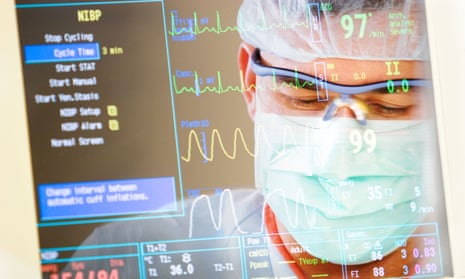Advances in clinical uses of artificial intelligence (AI) could have two profound effects on the global medical workforce.
AI, which mimics cognitive functions such as learning and problem-solving, is already making inroads into the NHS. In north London it is piloting use of an app aimed at users of the non-emergency 111 service, while the Royal Free London NHS foundation trust has teamed up with Google’s DeepMind AI arm to develop an app aimed at patients with signs of acute kidney injury. The hospital claims the project, which uses information from more than 1.6 million patients a year, could free up more than half a million hours annually spent on paperwork.
AI raises the prospect of making affordable healthcare accessible to all. According to the World Health Organisation, 400 million people do not have access to even the most basic medical services. Hundreds of millions more, including many in the world’s most advanced countries, cannot afford it. A key factor driving this is the worldwide shortage of clinical staff, which is getting worse as populations grow.
At last month’s DigitalHealth.London summit, Ali Parsa, founder of digital healthcare company Babylon, argued that mobile technology coupled with AI makes universal access a realistic goal, while replacing doctors with intelligent systems will slash costs.
“There is no solution which can fundamentally cut the costs of healthcare as long as we are reliant on humans,” he said.
So the second impact of artificial intelligence could be not merely augmenting the pool of medical talent but beginning to replace it. Big claims are being made for the clinical power of AI. Last year IBM’s Watson supercomputer was credited with diagnosing in minutes the precise condition affecting a leukaemia patient in Japan that had been baffling doctors for months, after cross-referencing her information with 20m oncology records.
However, the same system has just consumed five years and $62m (£51m) in an unsuccessful attempt to transform care at the University of Texas MD Anderson Cancer Center, showing how difficult it is to connect these digital behemoths to everyday hospital work. With the NHS still struggling to introduce electronic patient records, the idea of plugging the UK healthcare system into an all-knowing digital brain any time soon is fantasy.
While there is no doubt that AI will enable faster and more accurate diagnoses, a more realistic prospect than replacing doctors is to redefine their role.
That will be to put machine-generated information into the context of the unique life and needs of the individual patient, which cannot yet be reduced to an algorithm. As Dr Ameet Bakhai, consultant cardiologist at the Royal Free trust, told the summit, machines making clinical decisions on their own without that human context could fail to meet Isaac Asimov’s first law for robots of “do no harm”.
Digital evangelists argue that intelligent machines will be able to incorporate the latest data and research immediately, but that is both questionable and a potential weakness. Clinical trials vary in scale and quality, and indiscriminate inclusion would inevitably lead to mistakes. Digital hardliners would argue that machines should judge the quality of the research, but for the foreseeable future the expertise of doctors will be essential to deciding the validity of new approaches.
So perhaps one of the most powerful effects of artificial intelligence will be, perversely, to make healthcare more human and personal. It will remove the dependency on doctors’ fallible memory and incomplete knowledge, and free them to use machine-generated information to work with patients to shape their specific treatment.
This has profound implications for medical training and what defines a leading clinician. It will be those who can harness AI to their own medical knowledge and their human skills of context and empathy who will be the leaders of their profession. In the new world there will still be a great deal for highly-trained humans to do.
Join the Healthcare Professionals Network to read more on issues like this. And follow us on Twitter (@GdnHealthcare) to keep up with the latest healthcare news and views.

